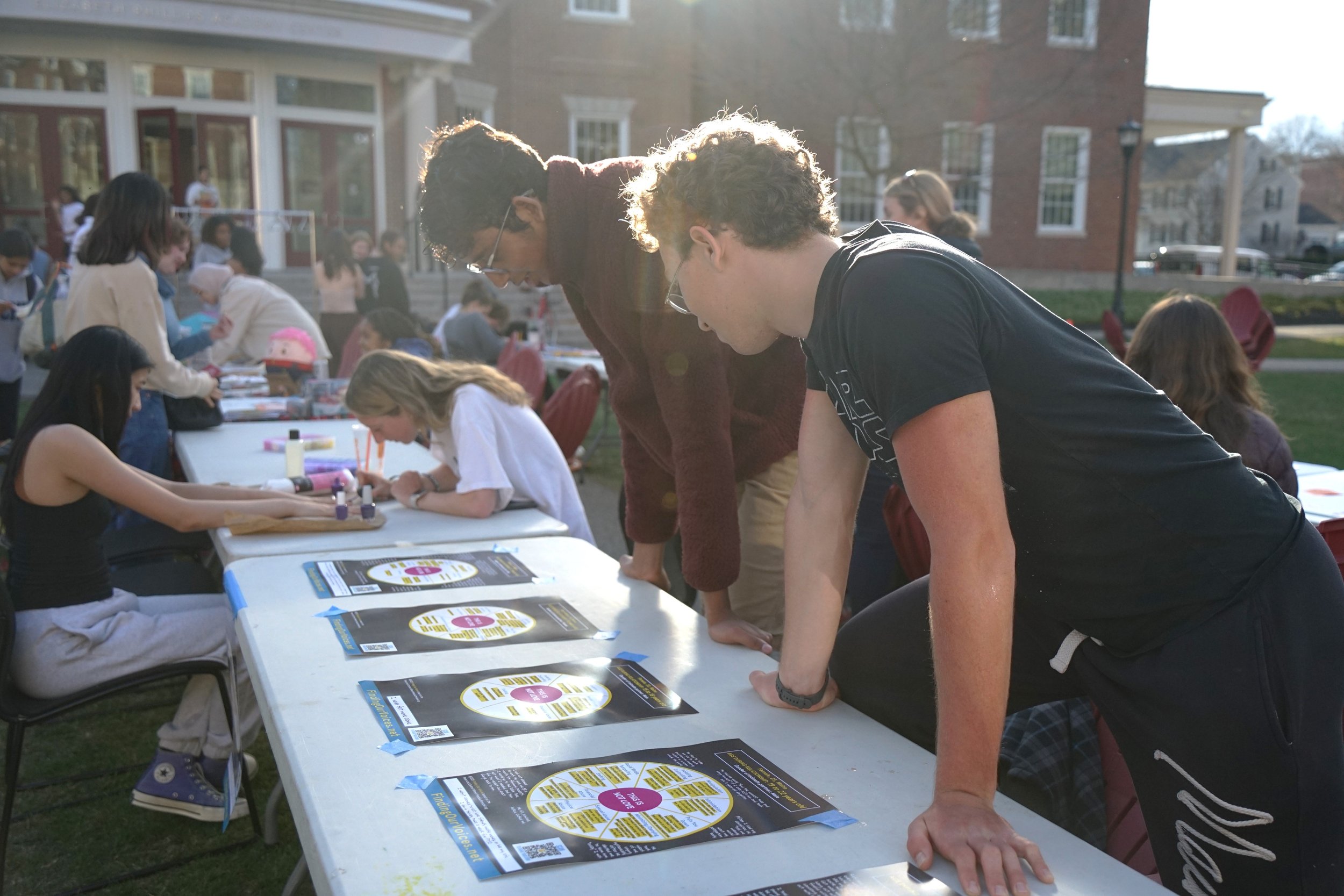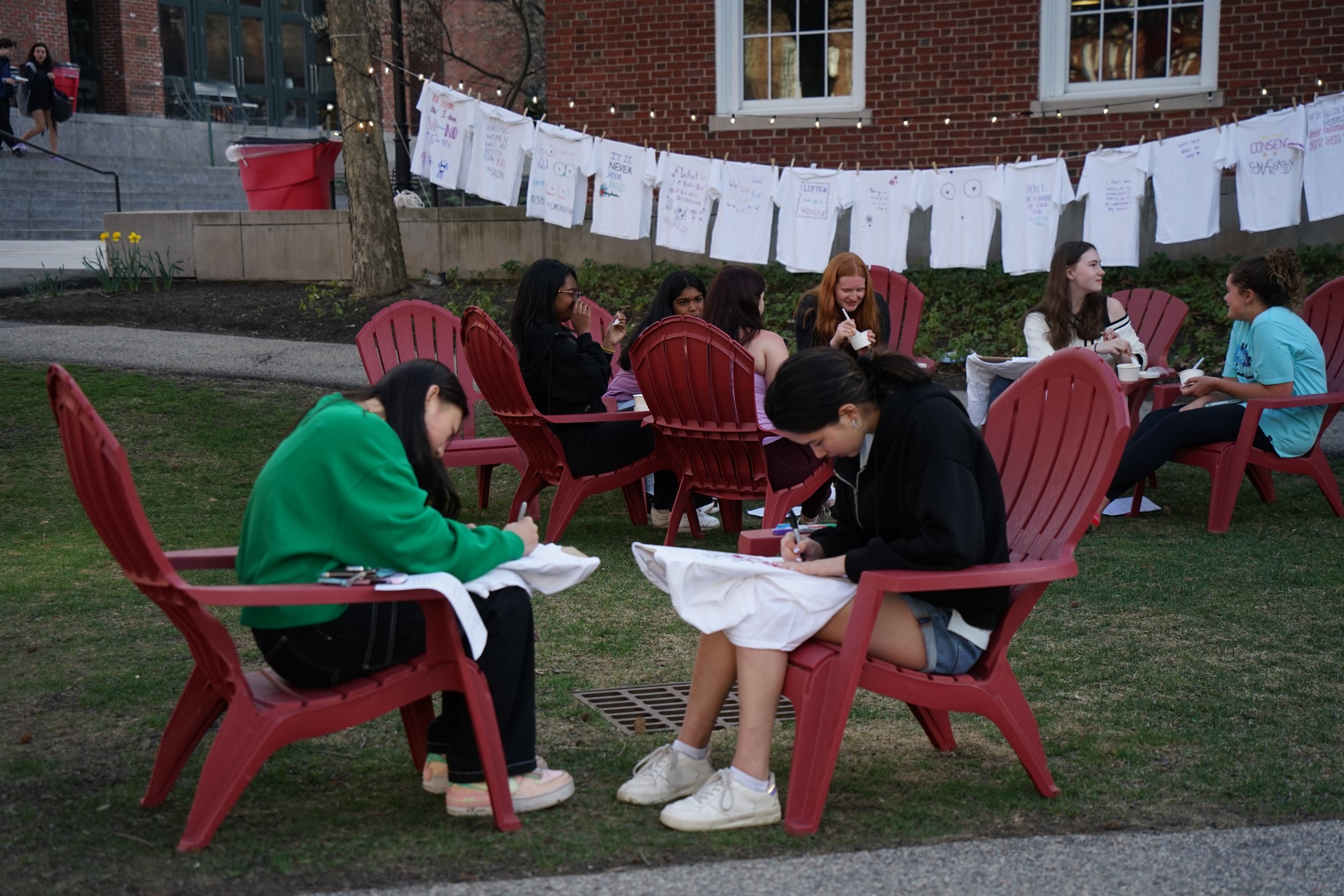Academy Holds Annual Take Back the Night Event
By MARY OLASORE and ELAINE QIAO
Students enjoy the Tiki decorations in the Fishbowl. Hillary Yoon / The Exonian
Take Back the Night, a worldwide movement standing in solidarity with survivors of sexual assault and fighting all forms of sexual violence, has become an annual tradition at the Academy. On Saturday, April 15, the third-ever Take Back the Night took place on the Academic Quad.
On the Thursday before, Exonians Against Sexual Assault (EASA) screened a video at assembly which explained Take Back the Night, what the movement meant to students across campus, and also featured numerous musical performances. On the day of the event, clubs and sports teams held booths with activities and information spreading awareness of sexual assault and violence as well as providing support and community for survivors. EASA handed out event pins and wristbands, while HAVEN, New Hampshire’s largest sexual and domestic violence prevention and support services agency, held a booth offering resources and support.
Simultaneously, screenings of the 2022 and 2023 Take Back the Night films were held during the event in the Forum. Students created T-shirts addressing sexual violence for the Clothesline Project, sending an array of supportive messages to survivors along with shirts from previous years. Gelato was offered in four flavors.
EASA co-head and upper Nupur Malhotra reflected on the significance of Take Back the Night at the Academy. “To me, Take Back the Night was kind of a moment to slow down,” Malhotra said. “I think the video reflected a lot of nice ideas about what Take Back the Night is. It is all about the community, which is why we asked the community what Take Back the Night means to them. It’s a moment for the whole community to come together, to reflect on ways that they’ve impacted or they’ve been impacted, or ways that people they know have been impacted in one way or another.”
“This topic is something that everybody should care about,” Malhotra continued. “Sexual assault is very real and it affects you whether or not you want to believe that it exists. This is why we have this event — to show everybody on this campus that this topic is real. This issue is real, it exists, you need to face it, you need to come together and build a community that accepts that this is an issue that we need to all work on.”
“Take Back the Night is really a great way of showing your support and solidarity for victims and survivors of sexual assault, sexual abuse and sexual violence,” upper Lucy Reading said. Reading helped run the Red Flag Green Flag booth, giving participants chances to write what they thought were indications of a healthy versus unhealthy relationship.
“I think by having a whole school-wide event, it really showed that all different types of people are there supporting you and that you don’t have to feel as closed off to people as you may feel in the moment. Also, I think the event was trying to help prevent people [from] getting into those types of relationships beforehand,” Reading continued, referencing the Red Flag Green Flag booth. “Then [there were] just more fun things like the beads in the hair, and also the T-shirts were always [a] really, really amazing part [of Take Back the Night].”
Upper Eden Murphy helped run the Red Flag Green Flag booth as well as Walk a Mile in Her Shoes, an event offering heels for participants to wear as a symbol for empathy and solidarity for survivors. “I think Take Back the Night is a good way of contributing to a supportive community on campus and showing the interest and effort of a lot of people who care,” Murphy said, echoing Reading.
“At Exeter, Take Back the Night is a reminder,” upper Aavik Wadivkar said. “It’s a reminder to ensure [that] campus is a safe space against sexual assault, a reminder to be aware of the violence that happens in the world and in our community, and it’s a reminder to take a stand against all forms of sexual violence by listening to survivors and guaranteeing that their voices are heard and not silenced. [It’s] a commitment to a better Exeter and a better world.”
Lower Natalie Jebraili agreed. “Take Back the Night…is a teaching opportunity and a safe space. We need to normalize these conversations to make a more safe environment for survivors to celebrate their strength.”
The planning of Take Back the Night took the effort of many faculty and students across campus.
“Planning took a lot of moving parts,” upper and EASA and Feminist Union co-head Stacy Chen said. “We host the event annually, so we were anticipating it for a while. But we had a lot to do beforehand. We met to talk about decorations, setup, Clotheslines Project, even little details like music. We also had to reach out to get all the clubs sorted. Logistics were tedious, but didn’t take too long thanks to all the help we had from adults,” Chen explained.
“I think a month or so ago, we started planning out the event and actually doing all the details,” Malhotra added. “We did a lot of work with Dr. Palmer. She’s been super helpful in putting this event together. In terms of the video, which was another big piece of Take Back the Night, a lot of help came from Kevin, Aavik and Carter. They were kind of the production team for that and we did a lot of work with them.”
“I worked with Ms. McGahie and Dr. Palmer for the video,” upper Kevin Treehan said. “They provided the script and oversight of the production. Lower Ian Kim was my production assistant, so he helped with the cameras and stuff on set. It was a pretty collaborative effort.”
“For the video, the primary drivers were Ms. McGahie and Dr. Palmer, who kept us on top of the filming schedule and cast list,” Wadivkar explained. “They maintained organization and communication between the filming team and EASA co-heads, as well as ensuring everything was done in time. I understand that Dr. Ullah reviewed and confirmed the scripts, among some planning for cinematography. Additionally, all three along with Dr. Martin Fox were present and aiding with setup and cleanup for the actual event, as well as keeping things running smoothly.”
“I hope that we have a chance to recognize and thank everyone involved in the process,” Wadivkar continued. “The EASA coheads, Stacy Chen, Maya Cohen, Riley Jones, and Nupur Malhotra, were all incredible with their work in organizing and leading the event….I only hope next year goes as well as this year — perhaps even better.”
“I think every single year, the Clothesline Project is always probably the most well executed thing,” Reading said. “Especially whenever anyone can go up and just write what they want to say on T-shirts. I think that that’s just such an impactful part. I really like that they continued to have this from last year.”
Students also recounted their favorite parts of the event. “I think my favorite part was whenever I was helping to run the Walk a Mile in Her Shoes booth, and Aavik was wearing the heels for over an hour,” Reading continued. “It’s not that he was walking a mile per se, but just the fact that he stayed in them. It was such a joyous moment coming from…awareness and empathy. And I thought that that was really funny.”
“While I did love the Walk a Mile in Her Shoes booth — quite enlightening for someone who doesn’t wear heels — my favorite part would have to be the T-shirts, hung by the trees and illuminated by string lights,” Wadivkar said. “These shirts all included intensely powerful messages and illustrations, from past years as well as this year, about raising sexual assault awareness, fighting back against rape and violence, listening to survivors and their stories, among many other equally significant messages.”
“Honestly, when I was at Take Back the Night, I think that Saturday was probably one of my favorite days of my life,” Malhotra said. “It was just so lovely to see everybody come together. I think within the first 15 minutes I was there, I could already feel tears coming to my eyes, just looking at people setting up their tables and everybody wanted to help…We all worked so hard to put this together, and seeing other people also pitch in and…be so excited about this…was so lovely.”
Upper Gigi Lannon agreed. “My favorite part was seeing all the people coming, smiling, and just supporting an important cause together [while] being able to have a good time with it,” she said.
When asked about room for improvement, Reading said, “I think it wasn’t really announced too far in advance, so I feel like people didn’t really have it on their radars. There was already a very large outcome, but I feel like there could have been a larger one if it was announced earlier.”
Murphy agreed. “I think that everything went pretty well, but maybe for next year, more advertising leading up to the event would get more people to participate. I didn’t know much until pretty last minute.”
“I think it was nice that it was outside and there was a lot of space for people,” Lannon said. “But I feel like the timing [of the event] was a little bit off. It was earlier in the day…but it was also cool when it was dark out too. I think broadcasting at a time where more people can come would be better for the future.”
Wadivkar expressed a desire for Exeter’s movement to expand. “I believe that a drawback to the boarding experience is that Exeter tends to be a kind of bubble…While it is important to emphasize the meaning and relevance of Take Back the Night to our community, I hope that Exeter can collaborate or somehow reach outside the scope of our school to expand [our] movement. This may involve reaching out to the Take Back the Night Foundation to become a chapter, collaborating with other boarding schools, participating in protests in nearby towns, and raising awareness outside of our bubble,” Wadivkar said.
“That being said, this year’s event was fantastic, and I understand that reaching out of Exeter also limits us to the whims of other organizations. I hope that regardless of expansion, Exeter’s chapter of Take Back the Night remains the incredible event it is year after year,” Wadivkar added.
EASA also emphasized the need for action. “Take Back the Night is a time for the community to come together, but the community also needs to take action,” Malhotra said. “How can we make Exeter a safe space? How can we ensure that people on this campus don’t have to be scared walking into their classrooms? You should be able to feel safe on this campus. That’s really what I want in the future — just people working towards making this a safe environment for survivors and to prevent [others] from having to experience sexual assault.”
Studetns enjoy the Tiki decorations in the Fishbowl. Hillary Yoon / The Exonian
Students enjoy the Tiki decorations in the Fishbowl. Hillary Yoon / The Exonian



